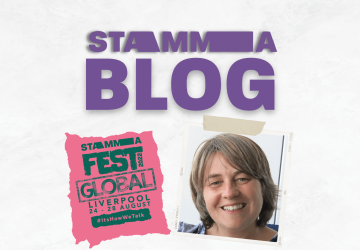
STAMMA Blog: Community building as SLTs
5th September 2022
Following our STAMMAFest conference, Kirsten Howells reflects on how she first realised there were others out there who stammered too, and encourages other speech & language therapists (SLTs) to help plant a sense of community.
I'm 48. I'm an SLT. And I work for STAMMA. You'd think I'd have got this stammering thing sussed by now. But, no. My relationship with my own stammering changes all the time. Sometimes it's comfortable. Often it's not. Sometimes I let it show. Often I don't. It certainly varies depending on who I'm with and the situations I find myself in.
Being at STAMMAFest has made me take another good, hard look at my stammering and the choices I make about it. I've realised that it's easy to hide behind my professional role, and not really engage publicly in sharing my own thoughts, feelings and opinions about stammering. Perhaps that's been another form of avoidance. Damn that conference!
So, here I am. It feels REALLY uncomfortable to share what I think of as "The Tale of When I First Went to Speech & Language Therapy". But I'm sharing it in case it's useful to other SLTs and because I think it might be a small contribution to some of the conversations that have taken place recently on the topic of how can we reach out a hand to those on the outside of the stammering community and bring them into the community.
So, I started stammering when I was 9. It was well before my parents realised and, when they did, they sought some advice and were told not to mention it, not to draw attention to it. So no-one said anything. And I worried about it. And felt ashamed for worrying about it. And felt stupid for feeling ashamed for worrying about it. And so on. Heading into my teenage years and young adulthood, I constantly hid my stammering and completely failed to build up any tolerance to hearing and feeling myself stammer. It was unthinkable. Avoidance took on a life of its own, as I pretended to have a sore throat and to lose my voice, or told outrageous lies — anything to get out of situations where my stammering might be revealed. To myself or to others. The shame of all those lies was monstrous.
I'm sharing it in case it's useful to other SLTs... on the topic of how can we reach out a hand to those on the outside of the stammering community and bring them into the community.
At uni, I opened up a little bit to some of my closest friends. But I didn't really have the framework to describe what was happening. The closest any of them got to understanding was, "You don't stammer. You just have a 'Kirsten way' of talking".
After uni, I started working in retail management and, in my late 20s, everything just came to a head. I was trapped in my own web of avoidances and lies. I broke down and knew that I needed to make a change to what I, at that time, described as "the worst thing in my life".
Getting a glimpse of community
So I called (or rather, got someone else to call) my local NHS Speech & Language Therapy department and, a few weeks later, was on my way to my first appointment. The department was based in a large local hospital and, after parking my car, I walked across the enormous car park towards the hospital building. The walk is memorable because I'm pretty certain it's the closest I've ever come to a panic attack. I was shaking and wanted to be sick and felt like I couldn't hear anything because my heart was beating so hard and so fast. I was terrified of saying the phrase, "I stammer". But I was more terrified that the response might be, "No, you don't". Because I genuinely didn't know what I would do if the therapist said that. It felt like I was on the brink of the void. And still, I was ashamed of feeling that way. That I had no right to feel that way. That there were people far worse off than me. That I was making a big fuss about nothing.
Despite the fact that sod's law was in full operation and I didn't stammer once during the session, the therapist took my "I stammer" statement in good faith and some of my fears began to dissipate.
And there was one thing she did that gave me a glimpse of a community beyond that little clinic room in that big hospital. She gave me a list of behaviours to read through and to tick off the ones that I did. It was full of many of the behaviours that may be familiar to some of us — changing words, avoiding situations, knowing what I want to say but can't get the first sound out, etc, etc. What was a revelation to me was that this was a professionally printed and formatted list. This had been taken from a book or some other publication. This meant that there were enough other people out there with these same experiences that someone had taken the time to create some way of capturing these behaviours. That a publisher had spent money creating a resource or book containing this list. This meant that I wasn't the only one. This meant that I wasn't making a fuss about nothing. This meant that I wasn't broken. This meant that I wasn't alone.
That list meant everything to me. It changed my life.
So, to SLTs out there, I think there are many things that we can share with people who stammer to reveal to them the existence of a community they might not have dared reach out to. There are mentors and conferences, local groups and online forums. And, for those of us who are perhaps hiding from our voices, there are podcasts. And there are lists. These glimpses into the community might feel small from the outside but they can be part of much bigger journeys. And who knows where that might lead.
Kirsten Howells is the STAMMA Programme Lead for Adults, and was on the organising committee of the STAMMAFest Global conference. You can read about the staff team, as well as our Trustees and Patrons, on our Who We Are page.
See our Speech & Language Therapists section for articles and resources aimed at SLTs.

































